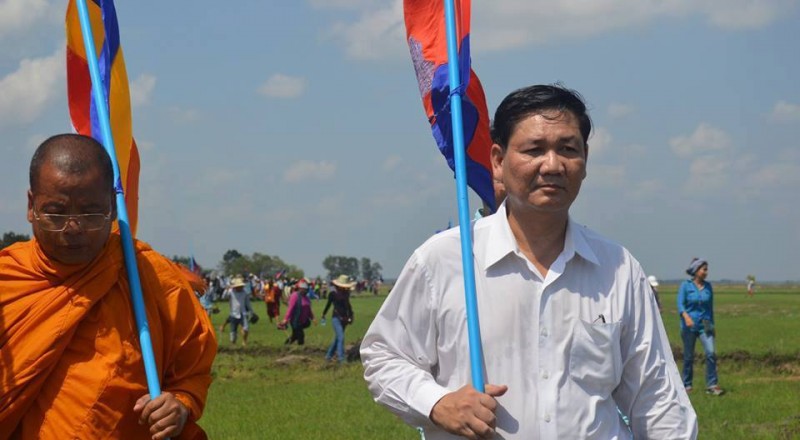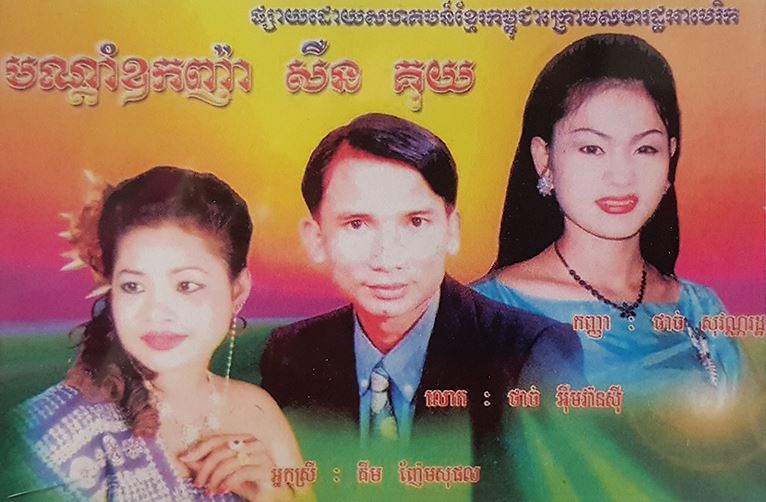The Paris Agreements at 25: Requiem Instead of Celebration
Fri the 5th Waxing Moon of Kattikā B.E.2560, November 4, A.D.2016 Year of the Monkey
Courtesy HRW
 When the Agreements on a Comprehensive Political Settlement of the Cambodia Conflict were signed by Cambodian leaders and representatives of 17 other countries in Paris on October 23, 1991, Cambodians had reason to hope for an end to one-party rule, political trials and political killings. Yet, 25 years later, the leader of the opposition is in exile, politicians and human rights activists are in prison, and dissidents continue to be killed. The prospects for free and fair elections in 2018 are almost nil and Cambodia is hurtling back toward a one-party state led by a violent demagogue, Prime Minister Hun Sen, who has been in power for 31 years. Why did Paris fail to deliver democracy and human rights?
When the Agreements on a Comprehensive Political Settlement of the Cambodia Conflict were signed by Cambodian leaders and representatives of 17 other countries in Paris on October 23, 1991, Cambodians had reason to hope for an end to one-party rule, political trials and political killings. Yet, 25 years later, the leader of the opposition is in exile, politicians and human rights activists are in prison, and dissidents continue to be killed. The prospects for free and fair elections in 2018 are almost nil and Cambodia is hurtling back toward a one-party state led by a violent demagogue, Prime Minister Hun Sen, who has been in power for 31 years. Why did Paris fail to deliver democracy and human rights?
Here are some of the key reasons why:
Free and Fair Elections Were Dead on Arrival
The Paris Agreements state that, “The Cambodian people shall have the right to determine their own political future through the free and fair election of a constituent assembly…under U.N. auspices in a neutral political environment.” While the U.N.’s Transitional Authority in Cambodia (Untac) staged an election that met international standards for technical fairness, CPP violence, intimidation and threats, along with a monopoly on the security forces, state media and state resources, meant the elections were neither free nor fair. Even before the ink dried on the Paris Agreements, the CPP set up death squads called “A-teams” (some of whose members are in government today) to target opposition party members.
Yet the desire for change was so strong that the opposition won a combined 69 seats to the CPP’s 51. The CPP responded by refusing to accept the results, even threatening a fake secession of the country’s seven eastern provinces. Instead of standing up to Mr. Hun Sen, the U.N. and key powers caved. Opposition activists who wanted to demonstrate to demand respect for the election results backed down when they realized the CPP might shoot them in the streets while the international community did nothing. Democracy, which requires the peaceful transfer of power from election loser to winner, was ransomed while thousands of U.N. soldiers stood by.
If elections couldn’t succeed when the world’s leaders and media were watching carefully, there was little reason to think they would fare better in the future. They haven’t.
Missed Opportunities by the Prodigal Son, Prince Norodom Ranariddh
While primary responsibility for Cambodia’s current plight rests squarely on Hun Sen, no one expected him to turn from despot to democrat simply by signing the Paris Agreements. Yet expectations for Funcinpec leader Ranariddh were higher.
Unlike Hun Sen, who grew up poor and had few life choices before he joined the Khmer Rouge, Ranariddh had led a gilded life. The eldest son of Prince Norodom Sihanouk, he was outside the country when the Khmer Rouge came to power, received a first-class education, lived a comfortable life in France and even taught law at a French university. He should have known right from wrong. Yet, within a year of becoming first prime minister, he seemed to set his sights on little other than pomp, ceremony and money. He not only ignored but showed disdain for those interested in legal or administrative reform, treating the U.N. human rights office and human rights NGOs such as Licadho and Adhoc as enemies.
Corruption was the byword for Ranariddh, who publicly admitted taking kickbacks from companies doing business with his government, making the astonishing claim that he had the right to take “commissions.” He lost support from his party and, perhaps most crucially, key diplomats like U.S. Ambassador Kenneth Quinn and French Ambassador Gildas Le Lidec, who openly despised him.
Ranariddh has defended himself by pointing out that the international community forced him, the winner of the Untac election, into a shotgun wedding with Hun Sen, an arrangement doomed to fail. This does not excuse Ranariddh’s behavior. Even if he acted with principles, he may still have been ousted in a coup, but we’ll never know.
Hun Sen’s Grenade Attack and Coup in 1997
It is clear that Hun Sen and the CPP never intended to implement the many human rights commitments in the Paris Agreements. From the time opposition parties returned to Cambodia to participate in the 1993 elections until the present, Hun Sen and the CPP have systematically used violence, threats and the courts to maintain a monopoly on power.
Hun Sen and the CPP ignored the disarmament provisions of Paris and ever since have made it an absolute priority to keep control over the army, gendarmerie (military police) and police. After a failed CPP coup attempt against Ranariddh and Hun Sen in July 1994, Hun Sen took control of the police from the Chea Sim faction of the CPP and appropriated the French-created gendarmerie as a de facto party organ. He also built up his personal bodyguard unit—in effect a large private army answerable only to him.
By 1996, Ranariddh realized that he couldn’t work with Hun Sen and began a rapproachment with former Finance Minister Sam Rainsy’s increasingly popular Khmer Nation Party. Hun Sen reacted with fury and fear: CPP sources say that he believed the CPP could not win the 1998 election if it was genuinely free and fair.
After a deadly March 30, 1997, grenade attack failed to kill Sam Rainsy, Hun Sen, overriding the objections of the CPP minister of interior, minister of defense, commander of the armed forces and other senior CPP officials, carried out what the U.N. called a “coup d’etat” on July 5 to 6, 1997. Using recently defected Khmer Rouge soldiers, gendarmes, police and some army units, he took power from Ranariddh, while unleashing a wave of extrajudicial killings of Funcinpec-aligned officers and soldiers. The coup effectively overturned the Paris Agreements and the Untac election in one fell swoop. This was followed by a bloody national election in 1998 in which the CPP’s Information Ministry announced the results before the ballots had been counted. Massive peaceful public protests ensued, but were met by security force violence.
A Feckless and Unprincipled International Community
While 17 countries signed a binding international agreement on human rights and democracy in Paris, almost all seemed to think they were ordering from an a la carte menu. While most commentary suggested that Paris was a way for the world to get back into Cambodia, in reality most governments saw it as an exit strategy.
It may be hard to imagine now, but in 1991 Cambodia was at the center of global geopolitics. Cold War alliances meant that relations among the U.S., China, the Soviet Union, Vietnam, Asean countries and others could not be sorted out until Cambodia was checked off the list of problem countries. Free and fair elections, human rights and democracy were necessary elements in an international agreement, but were never high on the international agenda.
The post-Untac story has been a constant downgrading of Cambodia as an international priority. Governments have used development aid as a smokescreen to cover their failure to engage in the kind of principled diplomacy and pressure necessary for serious reforms. Instead of calling the government out in a coordinated manner during election periods or after attacks on the opposition and civil society, donors have signed up to nonsensical “triangular” or “rectangular” development strategies with passages on judicial reform and human rights that Hun Sen has had no intention of honoring.
Just last week, Daniel Russel, a senior American diplomat, visited Cambodia, saying, “Rather than pass judgment, we are here to consult and put heads together with our Cambodian counterparts on how we can advance the goals of due process, rule of law and economic growth.” He went on to make the claim that the past year had been “a good year” in relations between the U.S. and Cambodia. As one Cambodian said to me: “What would it take to have a bad year? And the U.S. is the most outspoken government. God help us.”
The downplaying of human rights abuses to serve other agendas has been a staple of post-Paris diplomacy. Ambassadors like Quinn and Le Lidec supported Hun Sen after the 1997 coup, reaching the cynical conclusion that the country wasn’t ready for democracy and could only be ruled by a strongman. Quinn even had the temerity to tell me (then a staff member at the U.N. human rights office) that Sihanouk and Sam Rainsy had staged the coup to make Hun Sen look bad. Yet my guess is that even they would find the current state of Cambodian governance—near the bottom on indicators like corruption and the rule of law—far below even their worst fears.
This July, one of the architects of Paris, former Australian Foreign Minister Gareth Evans, admitted that the international community had gotten Cambodia wrong since Paris. “I think political responses from the rest of the world and certainly the rest of the region have been far too muted given the scale of the violations that have been going on for really a very long time now,” Evans said. He said the international community should put “maximum pressure” on the government to ensure the 2018 elections would be free and fair. “There may well be the case for contemplating the application of some kind of sanctions, targeting sanctions against individuals, just ways of placing overt pressure.” He admitted that he had given Hun Sen “the benefit of the doubt” for too long.
Quinn, Le Lidec and Evans have long since moved on, but Cambodians have been left to deal with the reality of an unstable and unpredictable leader who pitches the country from one unnecessary crisis to another. Hun Sen has consistently broken the fundamental promise of Paris: that the country’s future would be decided by ballots instead of bullets. As the next round of local and national elections scheduled for next year and 2018 draws near, the indifference of the international community is setting the stage for the next round of repression and violence.
Related
សូមគាំទ្រឧបត្ថម្ភ សហគមន៍ខ្មែរក្រោម Support KKC
សូមអរគុណដ៏ជ្រាលជ្រៅចំពោះសប្បុរសជននូវវិភាគទានទាំងនេះ។
We’re On Facebook

Sign in
Click here to reload the page over ssl.




